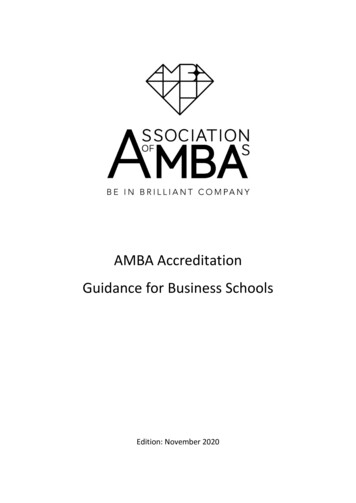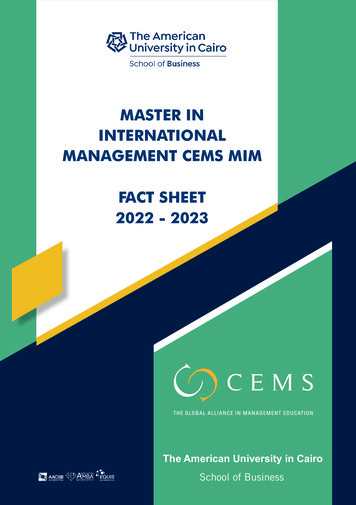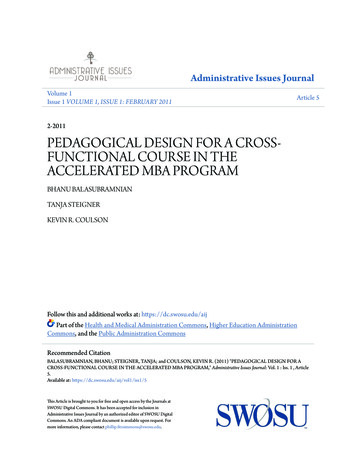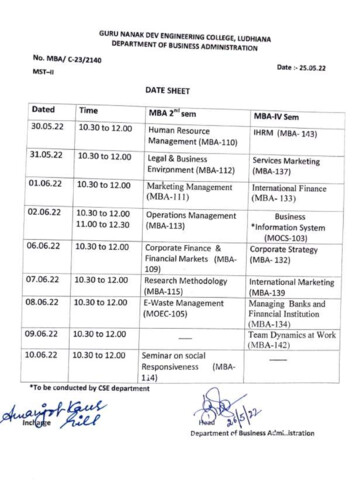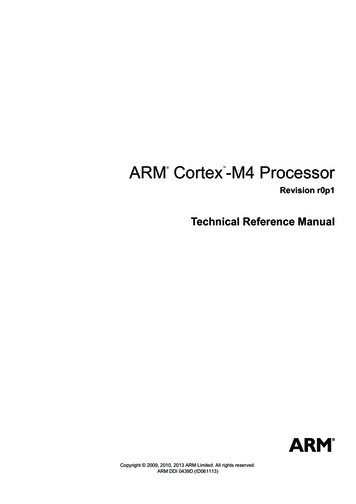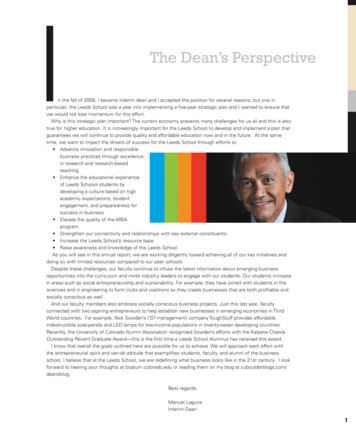
Transcription
Mission: “Through proven expertise and success, we are trusted advisors to our international higher education clients, supportingthem to make distinctive, lasting and substantial improvements based on recognised, global best practice.”AMBA – NEW MBA CRITERIA 2022:AS RELEASED 18 MAY 2022FOREWORDAMBA is committed to revising its MBA Criteria on a five year basis. The previous criteria were issued in 2016, but theCovid 19 Pandemic delayed the issue of updated standards in 2021. These have now been published (18 May 2022).The following is an overview of the changes, together with an assessment of the significance of the change.NB: This document represents QED’s interpretation of the revised AMBA MBA Criteria 2022. We recommend that youview the updated documents directly – which are available from AMBA’s website: AMBA New MBA Criteria 2022Currently (18 May 2022), other documents remain unchanged. Accreditation Guidance for Business SchoolsDBA Accreditation CriteriaMBM Accreditation CriteriaUnderstanding the new AMBA Accreditation Criteria (linked to 2016 updates)These documents can be accessed on the AMBA website.OVERALL SUMMARYThe updated AMBA MBA requirements should not provide any significant challenge for member schools. The changesare not extensive (other than layout). The most significant change (linked to impact) is very aligned with the evolutionof practice and focus within most business schools.Key changes include: Presentation of MBA Criteria across four principles (not ten). However, this reflects the condensing of theprevious 10 principles (rather than a ‘real’ reduction). The total number of criteria within these Principles hasincreased (though not significantly).The MBA Attributes have been updated (listed at the start of the document, and impacts Criterion 3.6).Additional focus has been given to Diversity and Inclusion (e.g. Criteria 1.7, 2.9 and 2.13)Principle 4 is significantly extended from the 2016 MBA Criteria – with a significant focus on impact as atransversal theme.There are no changes to traditional ‘key’ quantitative requirements (contact hours, minimum student group, advancedcredit requirements, experience requirements, faculty qualification expectations etc).Additional detail is provided below. Quality Education Development Ltd 2022Page 1
Mission: “Through proven expertise and success, we are trusted advisors to our international higher education clients, supportingthem to make distinctive, lasting and substantial improvements based on recognised, global best practice.”SUMMARY OF CHANGES –NEW AMBA MBA CRITERIA 2022INTRODUCTORY SECTIONS OF THE DOCUMENTPRE-AMBLE Previously known as “Overarching Themes”. There are some minor edits, but no significant changesMBA DEFINITION Key aspects remain unchanged (“generalist, postgraduate, post-experience degree” Definition extended to include reference to:o delivery modes (across spectrum of fully online to fully face-to-face)o Impact (the importance of having “positive impact on organisations and society”MBA ATTRIBUTESThese have been updated. Some elements (such as leadership, critical thinking, functional knowledge etc) remainsimilar to 2016. However, the new list places more emphasis on responsible management and having a positiveimpact on selves, organisations and wider society.FRAMEWORK & ELIGIBILITYThis is broadly aligned with the previous (2016) MBA criteria. The basic framework remains as before – with a focus on development and continuous improvement. Basic eligibility criteria remain unchanged:o Institutions must be graduating MBA students for at least three years (and only one programmeneeds to meet this criterion).o Institutions should have conformed to the majority of AMBA accreditation criteria for the threeyears prior to the first assessment. An additional ‘warning’ has been explicated on the Framework, stating “Accreditation may be removed at anytime if there are significant infringements of the accreditation criteria, or if other issues arise at the Institutionwhich may bring AMBA into disrepute”.MBA PRINCIPLES AN D CRITERIAPRINCIPLE 1: THE MBA PORTFOLIOEquivalent Principles within the 2016 MBA Accreditation Criteria: Principle 1: The MBA PortfolioPrinciple 2: Institutional Integrity, Sustainability & DistinctivenessPrinciple 3: Faculty Quality and SufficiencyPrinciple 1 in the new 2022 MBA Accreditation Criteria provides the institutional backdrop to the MBA Portfolio. Quality Education Development Ltd 2022Page 2
Mission: “Through proven expertise and success, we are trusted advisors to our international higher education clients, supportingthem to make distinctive, lasting and substantial improvements based on recognised, global best practice.” Material previously listed under 2016 Principle 1 (The MBA Portfolio) is outlined in the shaded box at thestart of page 6 on the AMBA document. There are no significant changes to this guidance.Material previously listed under 2016 Principle 2 (Institutional Integrity, Sustainability and Distinctiveness)and 2016 Principle 3 (Faculty Quality and Sufficiency) is now reworked and presented as the last paragraphwithin the shaded box (page 7 on the AMBA document), followed by Criteria 1.1 to 1.10There are no changes to requirements under 2016 Principle 2 (now Criteria 1.1 – 1.2)There are two changes to requirements under 2016 Principle 3 (now Criteria 1.3 – 1.10)o New requirements (Criterion 1.7) expecting that “Faculty teaching at MBA level should be crediblybalanced in terms of diversity. There is an expectation that faculty development and recruitment plansinclude mechanisms to measure diversity and respond appropriately where necessary”o Clarification added to Criterio 1.9, to say that the relevance of research output should be aligned “withthe School’s mission and definition of impact”.PRINCIPLE 2: THE STUDENT COHORT EXPERIENCEEquivalent Principles within the 2016 MBA Accreditation Criteria: Principle 4: Programme Design and Leadership (part only: Principle 4.3)Principle 5: The Student Cohort ExperiencePrinciple 9: Delivery and Interaction (part only: Principles 9.6 and 9.7Principle 2 in the new 2022 MBA Accreditation Criteria focuses on the Student Experience within the MBA. It includes all of the 2016 Principle 5 (Student Cohort Experience) with only minor changes to wording andlayout.It includes three elements from other 2016 Principles:o One element from 2016 Principle 4 (Programme Design and Leadership) – now listed as Criterion2.15 (student feedback mechanisms and related responses)o Two elements from 2016 Principle 9 (Delivery and Interaction) – now listed as Criteria 2.10(importance of collaborative learning) and 2.16 (provision of support through online platforms).There are two new elements within this Section:o Criterion 2.9 explicitly calls for gender diversity on programmes. “To ensure programme diversity andreflection of the real-world working environment, individual MBA intakes should be gender diverse andbalanced where possible.”o Criterion 2.13 requires institutions to have explicit policies and processes to “provide adequate protectionfor students and staff from sexually or racially motivated assault, harassment, and discrimination”PRINCIPLE 3: MBA DESIGN, CURRICULUM & ASSESSMENTEquivalent Principles within the 2016 MBA Accreditation Criteria: Principle 4: Programme Design & Leadership (All remaining parts)Principle 6: Competences, Graduate Attributes & Learning OutcomesPrinciple 7: Curriculum Breadth & DepthPrinciple 8: Assessment Rigour & RelevancePrinciple 9: Delivery and Interaction (All remaining parts) Quality Education Development Ltd 2022Page 3
Mission: “Through proven expertise and success, we are trusted advisors to our international higher education clients, supportingthem to make distinctive, lasting and substantial improvements based on recognised, global best practice.”Principle 3 in the new 2022 MBA Accreditation Criteria focuses on all aspects of the design, content, delivery andassessment of MBA Programmes. Criteria 3.1 to 3.3 include all remaining parts of the 2016 Principle 4 (Programme Design and Leadership) withonly minor changes to wording.Criteria 3.4 to 3.6 reflect all parts of the 2016 Principle 6 (Competences, Graduates Attributes & LearningOutcomes) with the only significant change being the updating of Principle 3.6 for the updated AMBA MBAGraduate Attributes.Criteria 3.7 to 3.14 reflect all parts of the 2016 Principle 7 (Curriculum Breadth and Depth). The only changecarrying potential significance is within Criterion 3.9 (which lists the major areas of knowledge requiredwithin MBA programmes).o Expectations for knowledge linked to CSR, sustainable development and societal well-being are nowseparated from those linked to ethics and risk management (previously combined).Criteria 3.15 – 3.19 reflect all parts of the 2016 Principle 8 (Assessment Rigour & Relevance). There onepotentially important development.o Criterion 3.16 now facilitates schools to potentially exclude individual examinations from theassessment strategy. However, this comes with a strong “health warning” which notes that Schoolsmust “provide an explicit and convincing rationale when individual examinations are not used within theoverall assessment strategy, since they are seen as valuable in testing intellectual rigour under controlledconditions.”. Individual assessment is still expected to “play a balanced role” in any assessment strategy.Criteria 3.20 to 3.25 reflect all remaining parts of old 2016 Principle 9 (Delivery & Interaction). There are a fewchanges, though none of material significance.o Criterion 3.21 recognises that typical part-time MBA programmes range from 18 – 36 months (nolonger a minimum of 2 years). If programmes are of less duration, Schools are required to provide arationale and evidence that there’s appropriate contact etc., time included.o Criterion 3.23 clarifies that the non-synchronous elements of blended/online programmes (i.e. the380 remaining contact hours after the 120 mandatory synchronous hours) should be “composed ofmandatory and interactive faculty-student group learning as well as mandatory, interactive and facultysupervised peer-to-peer group learning”. This clarification reinforces the expectation of some peer-topeer interaction within asynchronous models, plus the integration of appropriate faculty engagement andoversight.o Criterion 3.25 (v) includes the expectation that programme management and support for technologyassisted learning extends beyond programme delivery to include the “entire student journey”.PRINCIPLE 4: IMPACTEquivalent Principles within the 2016 MBA Accreditation Criteria: Principle 10: Impact & Lifelong LearningThis is a new Principle within the 2022 AMBA MBA Criteria. It incorporates the 2016 MBA Principle 10 (Impact andLifelong Learning) but goes significantly beyond the 2016 requirements. Principle 4 is set out as a ‘transversal principle’ that is ‘integral to all principles’. The over-riding requirementis for the Institution to: “articulate a clear definition of its desired impact, and have formulated a strategy, withclear milestones that are appropriately resourced, to achieve the desired impact. Furthermore, it should haveauthentic and measurable policies in place to analyse its impact. The Institution should demonstrate, in particular,how it (and its MBA portfolio) makes a positive contribution to the sustainable development of participants,organisations, its immediate ecosystem and wider society. MBA graduates should be able to demonstrate Quality Education Development Ltd 2022Page 4
Mission: “Through proven expertise and success, we are trusted advisors to our international higher education clients, supportingthem to make distinctive, lasting and substantial improvements based on recognised, global best practice.”significant career enhancement as a result of their MBA and should be supported in their continual development bythe Institution.” Criteria 4.1 to 4.5 set out AMBA’s guidance for impact – linked to overall strategy, outreach activities, facultyresearch/outputs, learning outcomes and responsible management.Criteria 4.6 – 4.9 reflect the 2016 MBA Criteria for Principle 10 (linked to long term success of graduates,career development supports and an active MBA association)ADDITIONAL CHANGES TO PROCESSES OR TEMP LATES/DOCUMENTATION REQUIREMENTSNo further updates or documents are published at this time (18 May 2022).For advice and further details on any of the above, please contact the QED Accreditation Team atinfo@QEDaccreditation.com. Quality Education Development Ltd 2022Page 5
Equivalent Principles within the 2016 MBA Accreditation Criteria: Principle 10: Impact & Lifelong Learning This is a new Principle within the 2022 AMBA MBA Criteria. It incorporates the 2016 MBA Principle 10 (Impact and Lifelong Learning) but goes significantly beyond the 2016 requirements.
